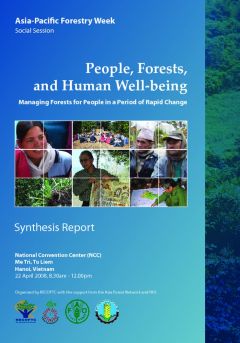Resource information
Under present and foreseeable economic and social trends in the Asia-Pacific region, can we achieve sustainable forest management and better realize the potential of forests and forestry to contribute to improved human well-being?
The session, organized by RECOFTC with support from the Asia Forest Network (AFN) and the Food and Agriculture Organization of the United Nations (FAO), questioned some of our assumptions and deepened both conceptual and practical understanding of fundamental issues affecting people, forests, and human well-being. Four presenters examined different aspects of the challenge from a range of perspectives, from the local to the global level. Is it possible to combine sustainable forest management and human well-being? Yes, concluded the social session of the First Asia-Pacific Forestry Week held in Hanoi, Vietnam from 21-25 April 2008 - but not without a fundamental restructuring of the way the forestry sector works. The session's discussion was underpinned by six propositions:
- Forests don't matter
- Poverty is not understood
- Change is driven from outside the forestry sector
- Changes in governance are essential
- Forests and forestry don't matter
- Climate change is a moment of opportunity
Key Messages
- Improved understanding on who the poor are, what causes poverty, and why poverty persists is needed to develop suitable policies that can address livelihood challenges and the various dimensions of poverty. This requires a solid understanding of local people's livelihoods and power relationships.
- We must recognize that forests and forestry have limitations in addressing poverty, and that this potential varies depending on the "degree" of poverty suffered by local people.
- Providing broader livelihood options and alternative income-generating activities outside the forestry sector may lead to greater poverty reduction.
- For effective participation, local people need to have more decision-making power. Fundamental structural changes in power relationships are necessary to achieve this.
- The role of the state in decision-making processes that affect local people and forests needs to be better understood. Greater attention should be focused on its policy and regulatory functions, service delivery, and relationships with civil and political society.
- While small-scale enterprises and access to markets can contribute to improved human well-being, the equitable sharing of benefits and the need to find an appropriate balance between income generation and resource conservation remain key issues.
- Climate change mitigation strategies will likely lead to a greater emphasis on forest protection, but will also create new opportunities to direct income to local people. However, issues regarding tenure, rights, access, and equitable benefit-sharing must be addressed to ensure such changes help rather than hinder local livelihoods.




